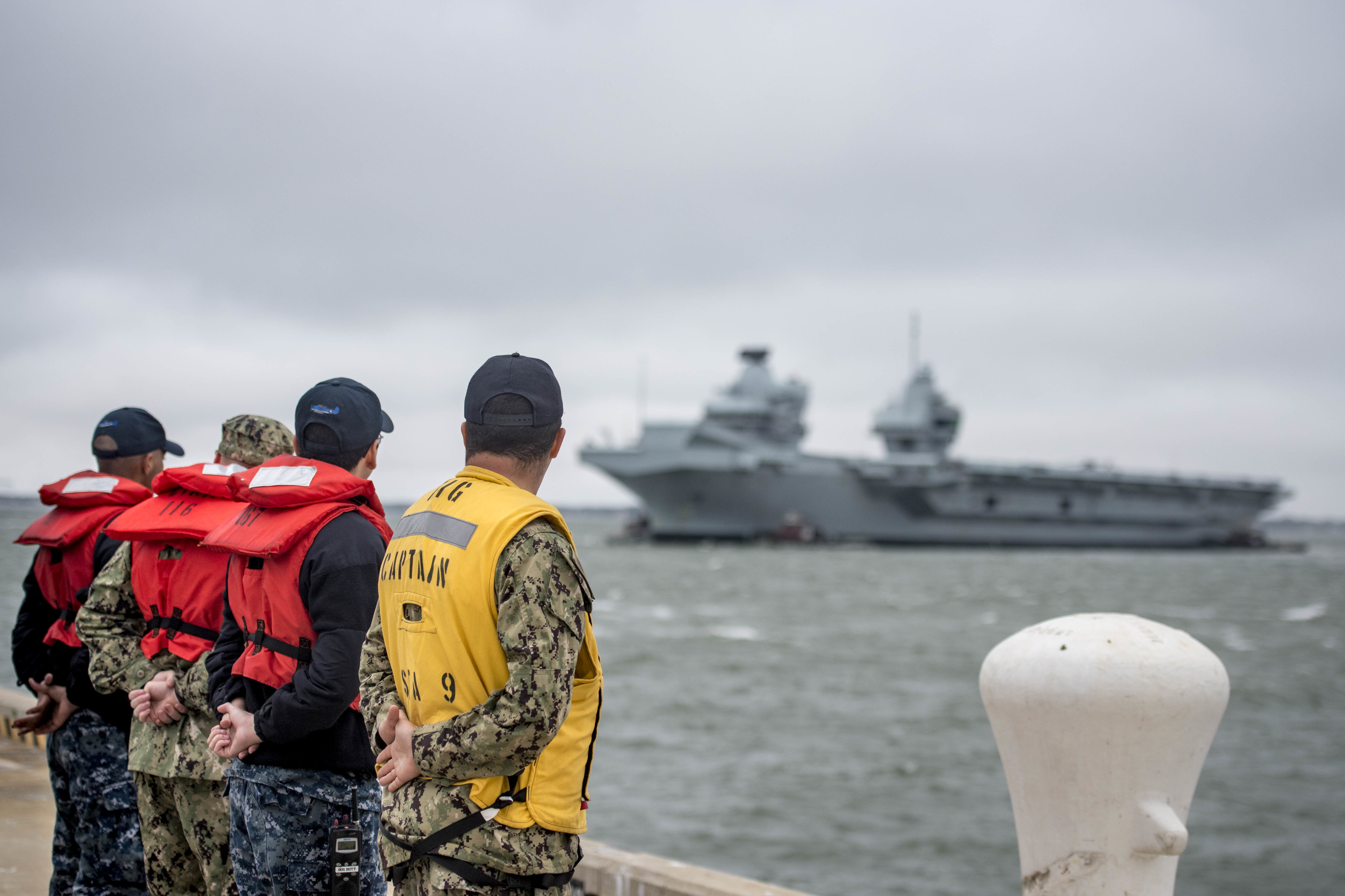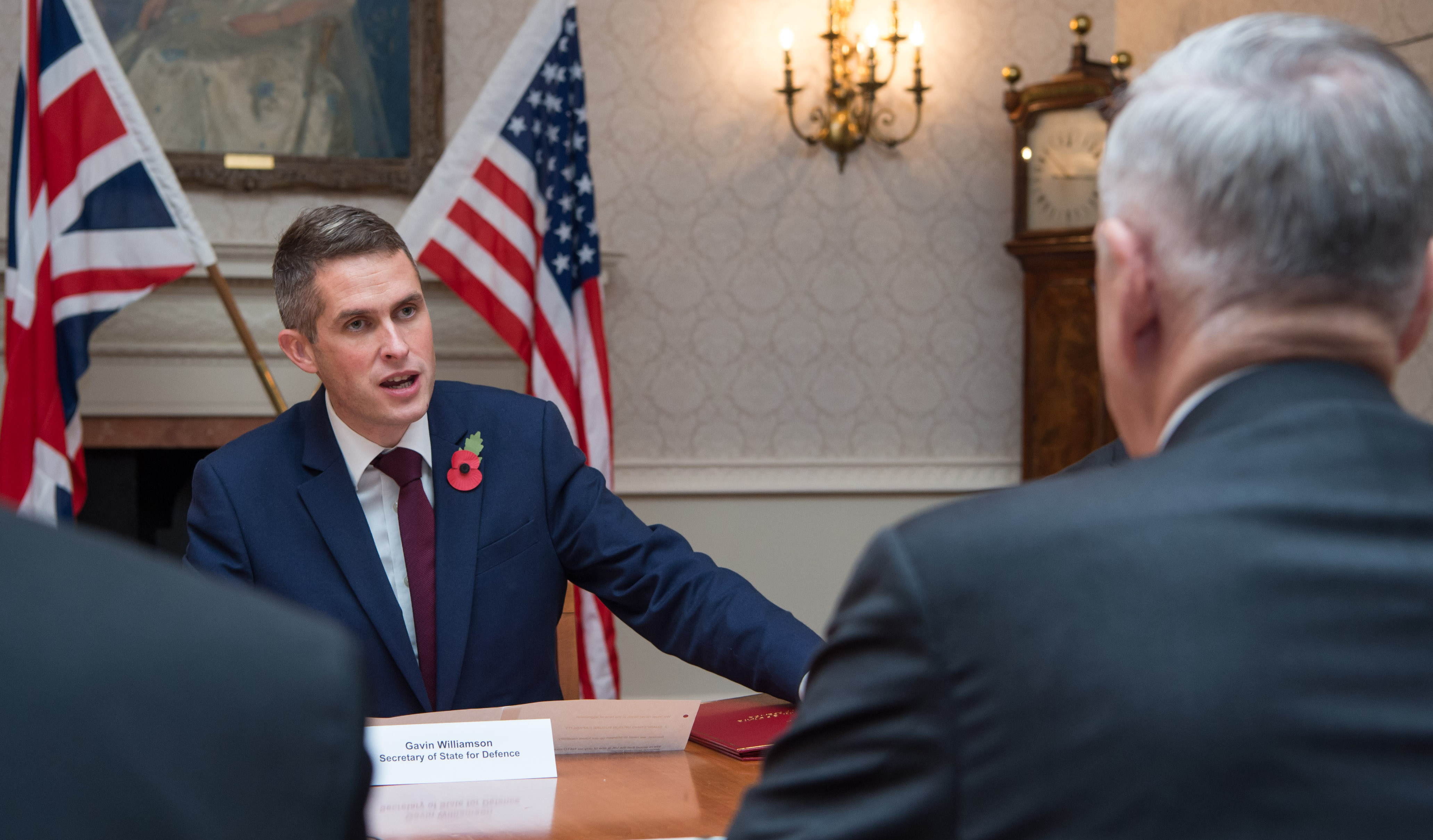By: John Grady
 Sailors assigned to the aircraft carrier USS George H.W. Bush (CVN-77) watch as the Royal Navy aircraft carrier HMS Queen Elizabeth II (R 08) pulls into Naval Station Norfolk, Va. Oct 27, 2018.
Sailors assigned to the aircraft carrier USS George H.W. Bush (CVN-77) watch as the Royal Navy aircraft carrier HMS Queen Elizabeth II (R 08) pulls into Naval Station Norfolk, Va. Oct 27, 2018.
The United Kingdom’s security relationship with the United States will remain “exceptional, uniquely wide and deep” even as the U.K. prepares to depart from the European Union next year, Britain’s top envoy to the United States said.
That relationship, Kim Darroch said Monday at the Hudson Institute in Washington, is built on trade, security, culture and more.
Zeroing in on security, Darroch said the two are tied to $150 billion in trade agreements for the next 10 years covering weapons and systems from F-35s, P-8A Poseidon aircrafts, ballistic-missile submarines and nuclear modernization programs.
As for support of the continued strong relationship between the two nations in the future, he added, “we find open doors and welcomes” from both sides of the political aisle in Congress and from administrations of both parties. He said he saw no reason for that situation to change after Brexit.
Building a new trade relationship with the United States, London’s largest commercial partner, after Brexit will “be the country’s number-one priority.” Darroch added.
“It can be much bigger – no quotas, no tariffs,” and “the removal of barriers on services” in the financial sector could provide additional opportunities.
Even after the departure from the EU, the United Kingdom intends to remain a global power. Darroch noted it “is a permanent member of the Security Council, the second biggest contributor to NATO” and “is a global player in defense,” with forces stationed in dozens of countries.
When it comes to the U.S.’s two primary threats, Russia and China, Darroch said the United Kingdom is “in a good place” with China despite past clashes over claims in the South China Sea, but the U.K. has poor relations with Russia that aren’t likely to improve in the near-term. He said the United Kingdom’s freedom of navigation operations (FONOPS) in the South China Sea are “not intended as a provocation” but rather a demonstration of London’s support of international law and norms.
“We believe the way forward is through engagement,” he added.
But in dealing with Moscow, Darroch said, “the relationship is not good.”
He reminded the attendees of the Kremlin’s use of lethal nerve agents in trying to assassinate a former Russian spy and his daughter in March in the U.K. and of Moscow’s continued support of separatists in Ukraine, including a naval confrontation Sunday in the Sea of Azov.
Darroch, who served as national security adviser to former Prime Minister David Cameron, said that tension with Russia “is not going to change for us” until the Kremlin changes its behavior.

U.K. Secretary of State for Defense Gavin Williamson meeting U.S. Secretary of Defense James Mattis in London on Nov. 10, 2017. DoD Photo
Several defense and economic issues become entangled for the U.K.: the country has and will continue to have after the Brexit tough economic sanctions against Russian citizens, companies and institutions imposed as punishment for Russia’s aggressive behavior in Ukraine. The United States and EU have been working in harmony on Ukraine and threats to other Russian neighbors.
The United Kingdom is also working with the international community to restore peace and security in Syria especially and Libya secondarily in the Middle East, but Darroch didn’t spell out details on how these goals might be achieved as Russia launched new air attacks backing Bashar al-Assad’s regime in the Syrian civil war.
When asked about Great Britain’s support for South Korean President Moon Jae-in’s efforts to woo North Korea’s leadership into ending its nuclear weapons program, he said London “basically strongly supports” that work, but “we haven’t seen yet real denuclearization.”
He added that, because the United Kingdom maintain an embassy in Pyongyang, “we know what effect the sanctions are having.” Until the North Koreans take serious steps toward ending that part of their weapons program, “sanctions are the right policy” to continue.
During a question and answer period, many questions came back to the ticking clock of Brexit in March and what would happen as a result of the EU departure.
One possibility, Darroch said, was expansion of bilateral trade and security agreements among the Commonwealth nations, all once part of the British empire. Among those countries are Australia, New Zealand, Canada and India. He said London’s membership in the EU had hampered these efforts in the past.
This weekend, the EU accepted the deal that would set the conditions for London’s withdrawal; next, the British Parliament must accept it as written or leave the union without any agreement.
Darroch noted the government has been “carefully avoiding saying what they would be doing” if that deal is voted down.
But “quite a lot of people think this is the best way forward,” and support for it at Westminster appears to be growing.
Darroch added that London would still be engaged in security, trade, commercial and financial arrangement with the EU even if the pact is defeated. London would work on new agreements with various countries on the continent during the 19-month transition period called for in the accord or in the aftermath of a parliamentary defeat.
No comments:
Post a Comment